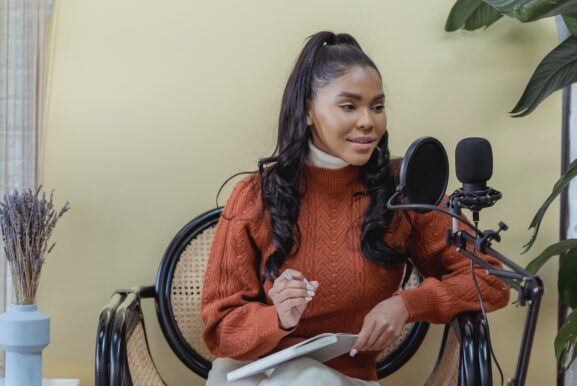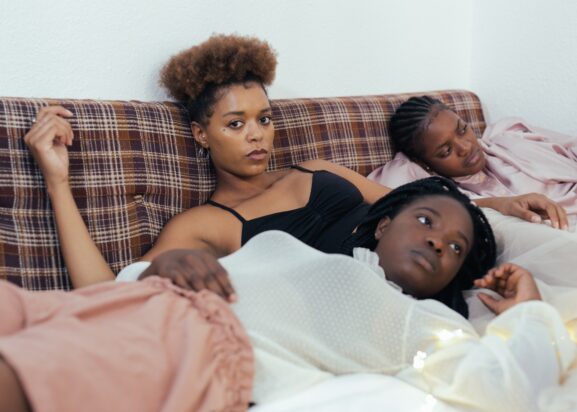Black Women Are Refusing To Board The Romantic Struggle Bus And Here Is Why
Black women have been shaking the tables on the dating scene lately. Eboni K. William’s interview with Iyanla Vanzant on The Grio recently went viral after she stated she would only date a bus driver if he owned the bus. It had many Black people up in arms and clutching their pearls at the audacity of her statement. People have very strong opinions about the topic which range from support of Eboni’s perspective to being offended and appalled at her thoughts. Those who agreed made the point that highly educated or high-earning women are justified in wanting a partner of the same educational or financial status. Many who disagreed with Eboni pointed out that men driving buses and making a lower income are kind, loving, and decent. In the interview, Iyanla shook her head at Eboni’s statement and explained that we need to build together as men and women instead of women expecting their partners to provide their happiness. Eboni responded to the uproar by explaining that her statement was not in reference to a bus driver’s income but to the idea of Black ownership. She explained she wants to see Black people be more than mediocre. She stated, “Could it be that Black America has been sold a narrative of average, regular, and typical being good enough for us?”. Though it is admirable that Eboni justified her response from a cultural upliftment perspective, might I suggest that personal preference alone is a fully justifiable reason to have said what she said?
A person’s romantic preferences are not an objective matter of right or wrong. Preferences, by their nature, are subjective. Meaning, they vary from person to person. They are not factual. There is no one correct preference. A person’s preferences are not wrong in and of themselves, though one person’s preference may not be suitable for someone else. Also, a person’s preferences may be problematic for the person they are dating. This highlights the importance of knowing what you want in a romantic partner and identifying which preferences are deal breakers or high-value items, for you. Knowing your preferences and deal breakers helps you make informed dating decisions. A romantic partner is one of the most influential people in a person’s life. The quality of your romantic relationship is a significant determinant of your life satisfaction; thus, choosing your partner should not be taken lightly and should not compromise your high-value items.
Lifestyle and companionship are high-value items for most people. The average person wants a partner to join them in the enjoyable life experiences they find essential. This does not mean couples should do everything together but most people do want to feel they have a partner with whom they are enjoying the best of life, however they may define this. If someone highly values a lifestyle that happens to involve things and experiences that require significant financial investment; such as traveling, buying a house, having a fully-funded retirement, building their children’s college funds, etc.; it may be necessary for them to have a partner who can financially contribute to these things in what feels like an equitable split. Of course, factors outside of a partner’s financial contribution play a significant role in having a healthy, happy relationship. A person’s behavior and personality traits are important factors. A financially affluent person is not necessarily generous and could be hesitant to share their money. Therefore, focusing solely on a person’s finances would be wrong when choosing a life partner. Yet, someone who values a lifestyle that requires a certain financial status and a more even financial split of life expenses must be sure to partner with someone with the financial means and generosity to do so. Otherwise, the relationship is vulnerable to resentment, anger, and a slew of other emotions that can result in relationship-harming behaviors.
Part of the problem is that many people equate preferences with judgments. They view someone who has strong preferences as someone who is passing judgment. Regarding the bus driver uproar, many people seemed to hear Eboni saying, “I would not date a bus driver because he is less than me and unworthy of me” but what she was actually saying was, “I would not date a bus driver because it is unlikely that he can share equitably in the financial requirements of the lifestyle I prefer to live.” This may feel harsh to some, but it is not wrong or hateful or judgmental. It is a preference based on a woman’s recognition of what she wants, as opposed to a judgment of value about a man’s worth or goodness.
It is safe to say that regardless of a woman’s personal perspective on the bus driver debate, Black dating has evolved in several ways—one of the biggest being Black women’s expectations for their partners. Many are now rejecting the ride-or-die struggle life in pursuit of the “soft life, ” resulting in these types of conversations. Ultimately, everyone has a right to want what they want, though they may not get what they want and certainly do not have the right to expect what they want from everyone. This is why vetting dating partners is essential. In this circumstance, vetting involves identifying what we want and need in a partner, communicating this honestly, and making informed decisions in our dating process. From this perspective, it seems Eboni is vetting well. She knows what is and is not for her and makes no apologies for it, as we all should.
Tracie Pinnock is a Licensed Marriage & Family Therapist and Dating Coach who helps women recover from breakups and date better the next time around. She is a single mom of two boys who she co-parents with two exes. She is actively dating and is a firm believer in the value of maintaining a full dating roster while on the journey to finding your ideal partner. Tracie shares advice on breakups and dating on her weekly podcast, Bitter to Better.



